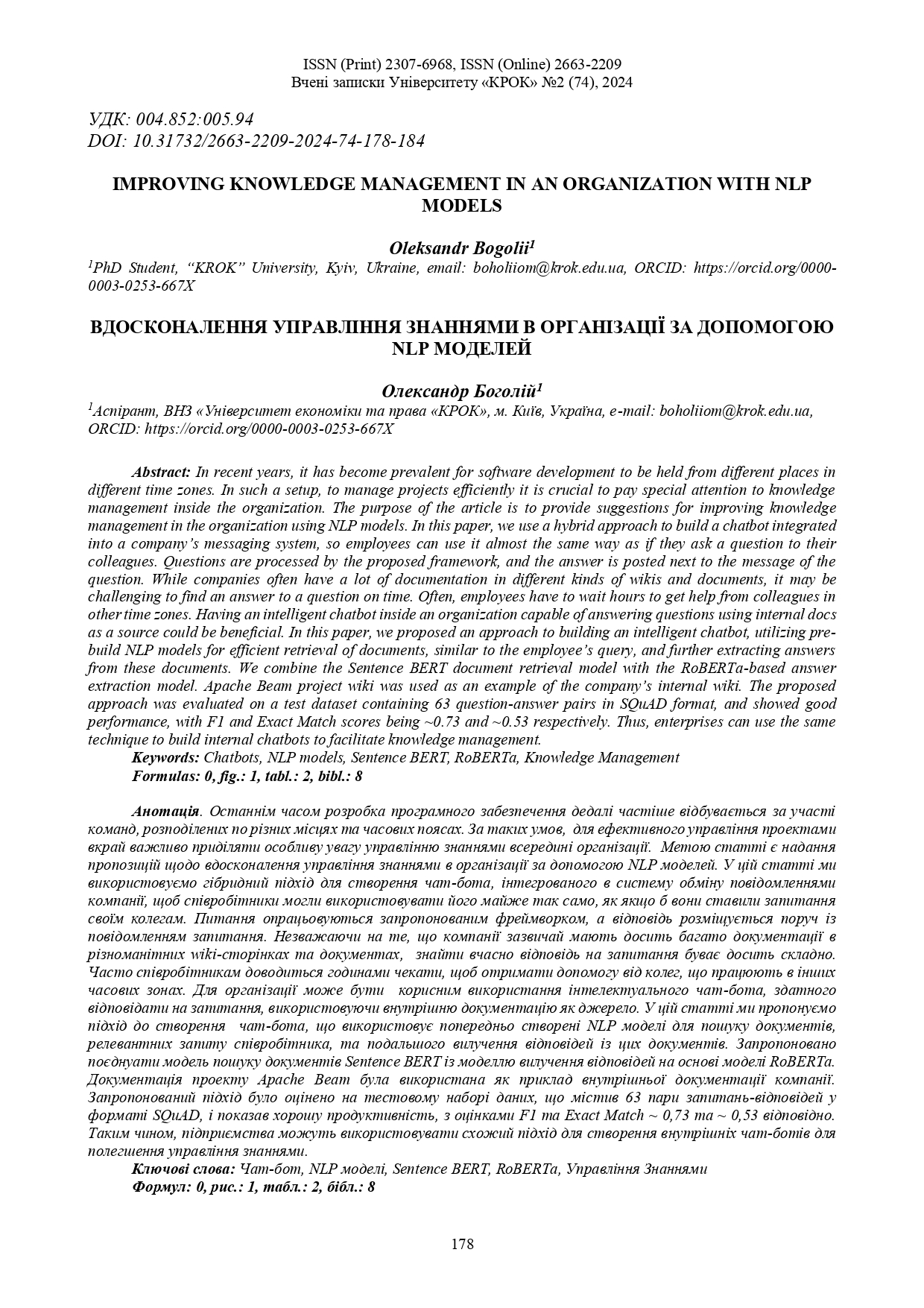IMPROVING KNOWLEDGE MANAGEMENT IN AN ORGANIZATION WITH NLP MODELS
DOI:
https://doi.org/10.31732/2663-2209-2024-74-178-184Keywords:
Chatbots, NLP models, Sentence BERT, RoBERTa, Knowledge ManagementAbstract
In recent years, it has become prevalent for software development to be held from different places in different time zones. In such a setup, to manage projects efficiently it is crucial to pay special attention to knowledge management inside the organization. The purpose of the article is to provide suggestions for improving knowledge management in the organization using NLP models. In this paper, we use a hybrid approach to build a chatbot integrated into a company’s messaging system, so employees can use it almost the same way as if they ask a question to their colleagues. Questions are processed by the proposed framework, and the answer is posted next to the message of the question. While companies often have a lot of documentation in different kinds of wikis and documents, it may be challenging to find an answer to a question on time. Often, employees have to wait hours to get help from colleagues in other time zones. Having an intelligent chatbot inside an organization capable of answering questions using internal docs as a source could be beneficial. In this paper, we proposed an approach to building an intelligent chatbot, utilizing pre-build NLP models for efficient retrieval of documents, similar to the employee’s query, and further extracting answers from these documents. We combine the Sentence BERT document retrieval model with the RoBERTa-based answer extraction model. Apache Beam project wiki was used as an example of the company’s internal wiki. The proposed approach was evaluated on a test dataset containing 63 question-answer pairs in SQuAD format, and showed good performance, with F1 and Exact Match scores being ~0.73 and ~0.53 respectively. Thus, enterprises can use the same technique to build internal chatbots to facilitate knowledge management.Downloads
References
Bogolii, O. (2023). Agile Software Development in a Remotely Working Geographically Distributed Team: A Systematic Review. European Project Management Journal, 13(1), 23–36. https://doi.org/10.56889/idnv2224
Vaswani, A., Shazeer, N., Parmar, N., Uszkoreit, J., Jones, L., Gomez, A. N., Kaiser, L., & Polosukhin, I. (2017). Attention Is All You Need (arXiv:1706.03762). arXiv. http://arxiv.org/abs/1706.03762
Robertson, S., Walker, S., Jones, S., Hancock-Beaulieu, M., & Gatford, M. (1994). Okapi at TREC-Reimers, N., & Gurevych, I. (2019). Sentence-BERT: Sentence Embeddings using Siamese BERT-Networks (arXiv:1908.10084). arXiv. http://arxiv.org/abs/1908.10084
Devlin, J., Chang, M.-W., Lee, K., & Toutanova, K. (2019). BERT: Pre-training of Deep Bidirectional Transformers for Language Understanding (arXiv:1810.04805). arXiv. https://doi.org/10.48550/arXiv.1810.04805
Liu, Y., Ott, M., Goyal, N., Du, J., Joshi, M., Chen, D., Levy, O., Lewis, M., Zettlemoyer, L., & Stoyanov, V. (2019). RoBERTa: A Robustly Optimized BERT Pretraining Approach. https://doi.org/10.48550/ARXIV.1907.11692
Question Answering on squad_v2. (n.d.). Papers with Code. Retrieved March 8, 2024, from https://paperswithcode.com/sota/question-answering-on-squad-v2
Apache Beam. (n.d.). Apache Beam Wiki. Retrieved March 8, 2024, from https://cwiki.apache.org/confluence/display/BEAM/Apache+Beam
Rajpurkar, P., Jia, R., & Liang, P. (2018). Know What You Don’t Know: Unanswerable Questions for SQuAD (arXiv:1806.03822). arXiv. http://arxiv.org/abs/1806.03822

Downloads
Published
How to Cite
Issue
Section
License

This work is licensed under a Creative Commons Attribution-NonCommercial 4.0 International License.

